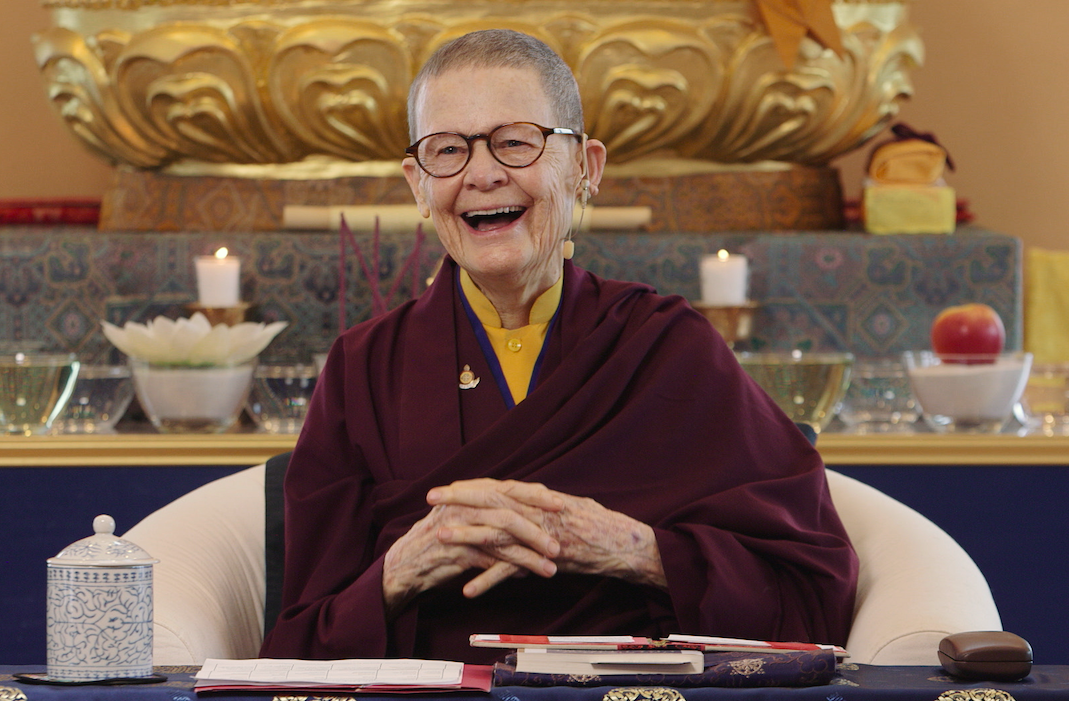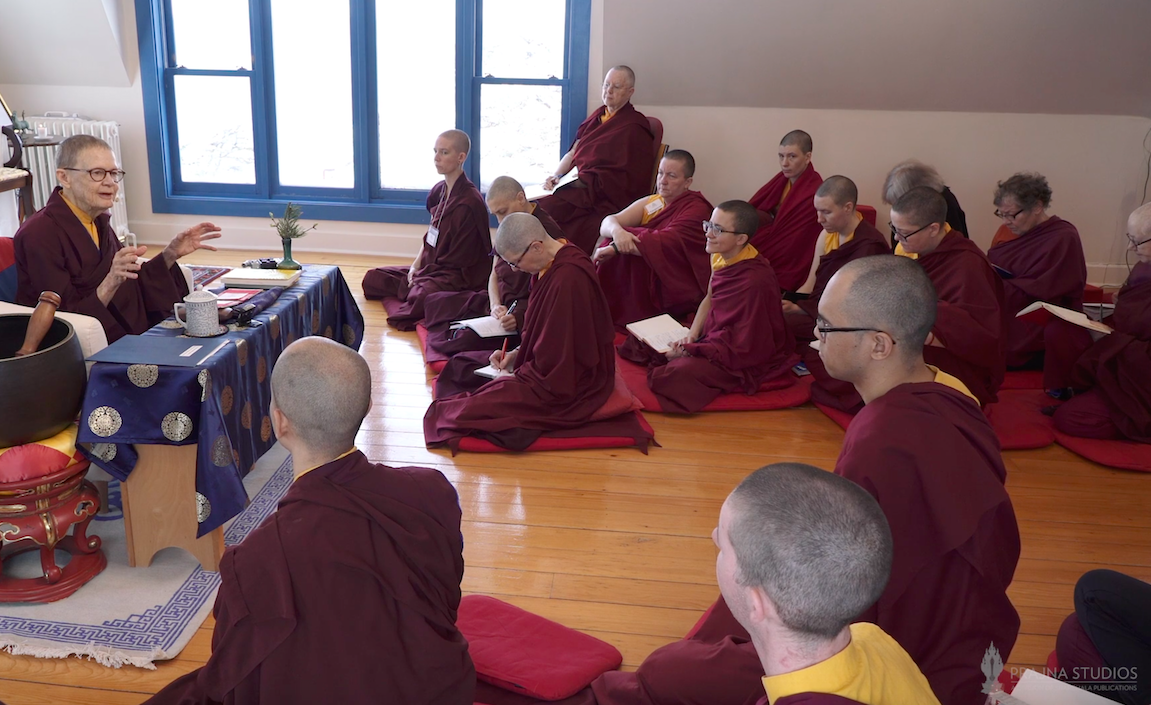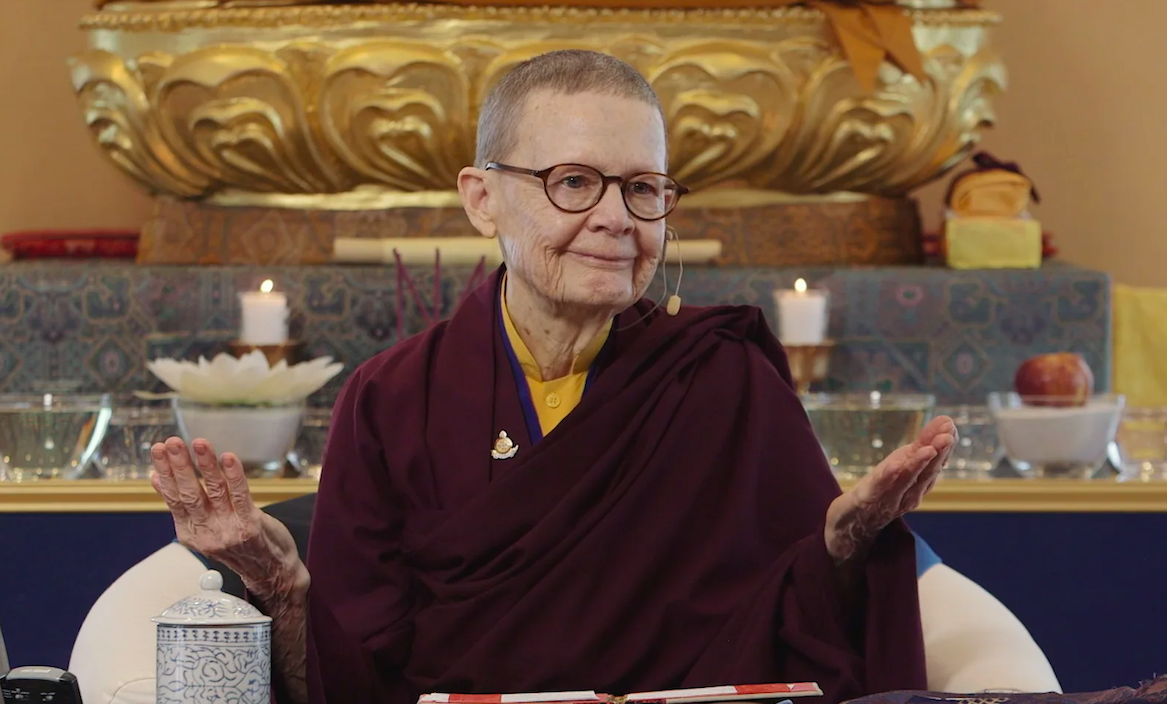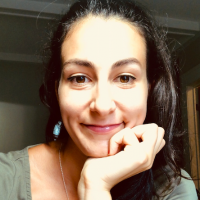This article is written in partnership with Shambhala Publications. They strive to contribute to the development of a thoughtful, kindhearted, and contemplative society, which is why we’re honored to work with them. ~ ed.
~
“And now as long as space endures,
And as long as there are beings to be found,
May I continue, likewise, to remain
To drive away the sorrows of the world.”
~ Pema Chödrön
~
To say that this year has been a helluva ride would be an understatement.
In the span of six months, the world shut down, I found myself living alone in a foreign city, I fell in love, and then got my heart broken pretty soon after.
A breakup is difficult in normal circumstances but in lockdown, everything felt heightened, more exposed. I remember sitting with myself in my attic bedroom in Dublin where I live and not knowing what I was going to do from there.
I was hurt by this unforeseen ending, yes, but I was more upset with myself. How did this happen again? I thought this time would be different. If only I could have done x,y,z, he wouldn’t have broken up with me. What’s wrong with me that someone couldn’t love me?
As someone who has had a tendency to numb with booze, exercise, dating…it was tempting for me to turn to those vices again. Only, this time, I couldn’t. Sure, the booze was just a grocery-shop away but I couldn’t go to the gym as I normally would. I couldn’t go to the bars and pick someone up or date to erase any thoughts of my ex.
Instead, I didn’t really have any option but to sit with this murky, dark, painful experience and try to understand why and how it had happened.
In Buddhism, these “pain-causing emotions” are known as the kleshas. Pema Chödrön explains that these emotions are the root of our suffering and, boiled down, they are: craving, aggression, ignorance, pride, and jealousy. It is only through understanding and getting to know our kleshas that we can make peace with them.
Getting to Know, Not Getting Rid
We often hear in Buddhist teachings that we need to “sit with our emotions,” but what does that really mean? In Pema Chödrön’s retreat, “Turn Your World Around,” she discusses the three steps for emotional transformation that help us understand our kleshas.
Learn what the 3 steps for emotional transformation are and dig into your kleshas >>
Instead of numbing or distracting ourselves away from negativity, we need to get curious about it.
Shenpa is that urge—or hook—that triggers our tendency to shut down when faced with difficult emotions. It’s also related to our attachment to things; we’re attached to a certain reaction when faced with our kleshas.
But what Pema teaches is that our kleshas are there for a reason. We can’t wish them away or hope that by understanding them, they will disappear. Instead, it’s about how we can reframe the story we’ve told ourselves. We can learn to get to know them and see that underneath them lies our basic, fundamental goodness.
Becoming Aware of our Attachments & Triggers
When I met my now-ex, I thought I was ripe and ready for a relationship. I’d been alone for most of quarantine and the restrictions had eased up in Ireland, so I was meeting him outside for park dates. I felt confident. Care-free. Like I finally had this whole relationship thing figured out. Well, not so fast.
Fast-forward a few months in and the same fights that would happen in my previous relationships were coming up again. I recall a particular evening when we both wanted to do different things; we couldn’t compromise and it resulted in me sulking and then having a “temper tantrum” (as he put it), and not speaking to him or anyone else the rest of the night.
The next morning, I felt so ashamed. Who was this person who had acted like that? How come I couldn’t have just shrugged it off and been more easy-going? I felt like I was a 12-year-old girl, yelling at my parents and shutting myself off from the world in my bedroom.
And maybe that’s what had happened. Something in that moment had triggered me, and the hook—the shenpa—was there, and I clung onto it.
What I wish I had done now was what Pema describes as “learning not to bite the hook.”
Join Pema today to start your journey of emotional transformation and turn your world around >>
I wish I had recognized the anger, heat, build-up in my body was a reaction to something probably much bigger than the in-the-moment argument, and that I could have excused myself for a few moments to take a breather and let myself cool off—taken a “mindful gap” of pause.
There was a story in my head at that moment. One that said, He doesn’t care about me. He doesn’t want to spend time with me. But the reality was that he just wanted to do something different! There was no ulterior motive. And my suspicion that there was one caused the incident to blow up.
Had I realized all of this, taken the time away, and then come back with a lighter heart and more understanding, the evening could have been different. I would like to say that maybe we wouldn’t have broken up, but I’ve also come to realize that he had his own triggers that caused him to pull away from me. I am only responsible for my reactions, and I have to let go of what could have been.
“Instead of seeing shenpa as an obstacle to be overcome, it is more helpful to consider it an opportunity for transformation, an open doorway to awakening.” ~ Pema Chödrön, Taking the Leap
Sometimes, we only Learn the Hard Way
In Pema Chödrön’s book, Taking the Leap, she describes an incident where she knew she was deep in the throes of shenpa, but chose to continue with the reaction anyway. The results were not great—well, she did get done what she had intended, but the person’s opinion of her had forever changed from “spiritual teacher” to “neurotic witch.” Even though she apologized to the person profusely afterward, there was no undoing what had been done.
What struck me from this example was the acceptance of and curiosity about the result. She now saw what happened when she reacted out of anger and was able to learn from it going forward.
Sign up and gift a second enrollment to a friend or loved one for free >>
I think of my relationship ending in the same way. Now that I am aware of some of these triggers and reactions, I can acknowledge them. I can accept that perhaps this was a lesson I just had to learn the hard way.
Life will never be absent of difficult experiences—be it small arguments with a partner, or a global pandemic, or the loss of someone we love. It’s by learning “not to bite the hook” in these more ordinary moments that give us the strength to tackle whatever bigger difficulties may lie ahead.
“As human beings we have the potential to disentangle ourselves from old habits, and the potential to love and care about each other. We have the capacity to wake up and live consciously, but, you may have noticed, we also have a strong inclination to stay asleep. It’s as if we are always at a crossroad, continuously choosing which way to go. Moment by moment we can choose to go toward further clarity and happiness or toward confusion and pain.” ~ Pema Chödrön, Taking the Leap
~






Read 21 comments and reply